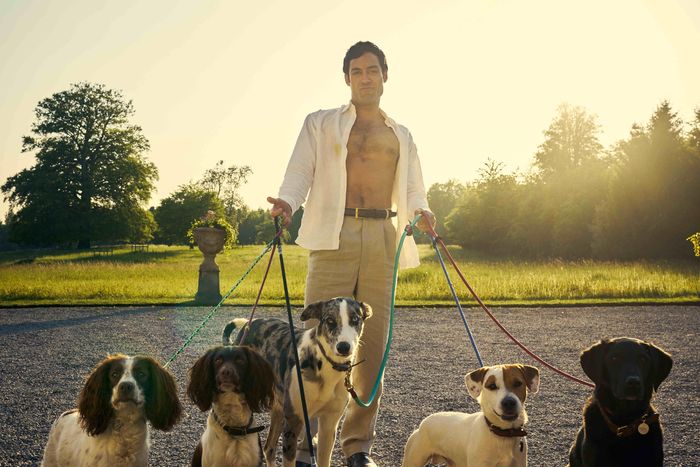
If you’re in the northern hemisphere right now, it’s cold, it’s dark, you’ve barely made it through a long year and you have to go to oh-so-many holiday parties (the latter two things may also apply to those Down Under). If your brain feels as if it is flickering toward a black screen like a four-year-old iPhone, I have the show for you: an unabashedly horny drama about British people hooking up in the countryside. Treat yourself to Rivals, a very ’80s romp that is nominally about the complicated dynamics of a regional television network but mostly considers a world in which if two characters might possibly have sex in a scene, they do. What fun!
In case you’re not already intimately familiar with the world of Rivals (on Hulu or Disney+ outside the U.S.), it’s based on author Jilly Cooper’s best-selling series of “bonkbusters,” as they are both affectionately and derogatorily dubbed, set in the fictional village of Rutshire in the Cotswolds. (The locale might seem rustic to Americans, but around the mid-’80s, it became a big Hamptons-esque getaway for the London glitterati; nowadays, the region has its own Soho Farmhouse and Rita Ora is always there.) The show has already picked up enough steam, especially across the pond, to be renewed for a second season, but hasn’t necessarily caught on with as much fervor here. Let me tell you: Now is your time.
As Rivals begins, a serious and very mustachioed BBC TV host played by Poldark’s Aidan Turner has moved his family, including his neglected wife (Victoria Smurfit) and idealistic daughter (Bella Maclean, playing a 20-year-old, who is thus old enough to participate in the sexcapades, as the show keeps awkwardly insisting), to ye olde sheepherding country to take up a gig at private TV network Corinium. The station is led by David Tennant, who is constantly glowering and constantly in pinstripes, while Nafessa Williams provides the requisite dose of Reaganism as an American producer in a power suit, and The IT Crowd legend Katherine Parkinson has a delightful time playing a ditzy local romance author married to the network’s morning-show host. While I haven’t wasted blog-post space giving you all the characters’ names, I do have to announce the show’s wildest character with his full double-barrel sobriquet: Rupert Campbell-Black (played by Alex Hassell), a former show jumper (sure!) who becomes Margaret Thatcher’s minister of sport (of course!) but spends most of his time sleeping around the local villages. He is introduced, naturally, in the show’s opening scene, thrusting into a woman in the bathroom of the Concorde as the plane goes supersonic.
The rest of the series proceeds with the same level of commitment to having characters hook up in the wildest ways possible whenever possible. Pretty much everyone gets to participate in some level of intimacy: You’ll bear witness to innumerable affairs, office romances, rolls in the hay, and a hearty serving of longing that, after a fair amount of edging on the show’s part, gets sweetly requited. Rupert, a sort of Byronic hero transposed into 1986, is always taking off his shirt dramatically and doing things like playing tennis naked with someone else’s wife. And while it tends to rankle that so many of these characters are Tories, the show does prod against the politics of the era — there are secret gay trysts, a head-on treatment of harassment in the workplace, and Turner’s character gets to grouse a lot about Thatcher and Ireland — while also leaning into 1980s aesthetics with such earnest delight that it ultimately wins you over. (Midway through my binge, I considered buying myself some giant shoulder pads.) The show isn’t intentionally camp, and it doesn’t tend to wink at its characters’ predicaments with ironic distance; it’s rather the product of actors committing very seriously to an inherently campy object.
That principle informs the latter half of the show’s first season, which becomes about the worth of the pursuit of pleasure in and of itself. Through several convolutions of the plot I couldn’t possibly explain, the characters all end up vying for the rights to the Corinium franchise, debating, in the process, what television should be. The kinds of shows produced under Tennant’s character’s watch are, like Rivals, populist entertainments that a puritanical person might dub “guilty pleasures.” Its big hit is something called Four Men Went to Mow and seems to consist primarily of shots of hot, shirtless men tending to tall grasses (one has to assume that’s a reference to what Aidan Turner got up to in Poldark). Rivals argues that this isn’t necessarily a bad thing; television, in its universe, exists for the sake of a good diversion. It can provide a vehicle for a hard-hitting interview or two, which Turner dutifully provides, but Rivals insists that the entertainment side of things is of substantial value, too. As Hassell and Turner, our stalwart heroes, go up against Tennant, they do argue that Corinium’s offerings have become too soporific, but they and Rivals are not about to eliminate any fun from your TV screens. The serious can exist alongside the inane, and the two enhance each other; in this universe, everyone deserves the right to a good bit of fun, and mass entertainment must serve the solemn duty of providing it. I’m willing to be swayed by the argument, at least for a good season or two of soapy television.
More TV Reviews
- Meghan Markle Pioneers New Frontiers in Unrelatability
- Marvel Won’t Let Daredevil: Born Again Live
- We Were Too Hard on Winning Time


